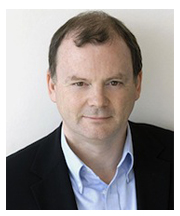What's happening to journalism?
Is it "over" -- or just evolving?
One thing is certain -- many of the subjects of mainstream journalism are taking the pen in their hand and becoming content creators themselves. If anyone knows, it's Richard Sambrook, whose storied career at the BBC spanned newsgathering, technology, and the World Service.
He spent the last years at the BBC rethinking the role, purpose and relationship of the news organizations with the public.
Then he left.
 Sambrook says he began thinking about the changing relationship between journalists and the public in 2004. "I began exploring social media and the role it was playing and how it was transforming relationship between the public and organizations and traditional media" explains Sambrook. At first, he took on the challenge of evolving the BBC's role in how it engaged its audience.
Sambrook says he began thinking about the changing relationship between journalists and the public in 2004. "I began exploring social media and the role it was playing and how it was transforming relationship between the public and organizations and traditional media" explains Sambrook. At first, he took on the challenge of evolving the BBC's role in how it engaged its audience.
Sambrook's journeys in Journalism began in the late 70s, where he worked on a small 3,000 circulation paper in South Wales as a trainee reporter. After a stint at the evening newspaper in Cardiff, the capital of Wales, he joined the BBC as a sub-editor, writing radio news.
"I worked my way up the ladder in radio, did a quick spell in regional TV, local TV, and then went across to the national TV newsroom as a reporter and then eventually an editor, moved into management into news-gathering operation across radio and TV."
He managed camera crews and reporters for all of the foreign bureaus, and then spent a year managing and restructuring BBC sports. He was one of the rare journalists who was both trained in newsgathering and in operations, and he wasn't afraid to embrace change in both technology and business operations.
He spent four years running BBC News, and then moved over to the global news operation -- the BBC World Service in 32 languages.
He is now the chief content officer for Edelman Public Relations, the largest independent PR firm in the world. His job is to work with Edelman's global clients to develop their own content. "All media are struggling with a digital transition at the moment, and in one sense journalism, certainly in the U. S. and Europe, is shrinking."
The era of mass media reaching mass audience has ended, and the business models of both media and advertising are shifting from mass to micro.
"Media companies are struggling. Spot advertising is recognized as less and less effective and, therefore, in that gap lots of companies and organizations are looking for new ways to engage consumers." It's worth remembering that Sambrook, as a lifelong member of one of the world's most respected news organizations, can't have come to these realizations easily, or without some personal conflict. Yet he seems clearheaded and optimistic about where this takes us.
Social media is inherently two-way, and Sambrook advises his clients that they both talk and listen in this new world. Sharing information could come in the form of a product launch, a brand proposition, or a corporate point of view.
"Digital provides companies with an opportunity to go direct to the public rather than wait to be mediated by journalism" says Sambrook. "Every company not only has the opportunity but the responsibility now to tell their own stories, their own narrative."
Responsibility. Wow. He's not saying "opportunity." Sambrook says in the world of democratized distribution -- customers or potential customers expect to be able to find a company publishing media. That secondary sources (reporters, blogs, re-tweets, etc.) are important, but that the first source needs to be the story told from the story owners perspective. Wow again.
As an example, Sambrook points to health information -- where consumers are shifting who they listen to and how they get information:
If you have a difficult health issue and you go online to find out more about it, actually the most useful sites come from the big pharmaceuticals or centers or the charities. The least useful sites are the news sites and the health journalists because they are just peddling stuff secondhand and you want to go direct to the source.
Sambrook says he asks clients: "What are the issues that you want to own in the conversations that you want to have a stake in and let me as a former journalist help you understand how to have a voice in those conversations and how to have a position in that issue."
And the way that brands and companies "speak" in the new social media world requires some new thinking as well.
Brands have to learn humility in order to get some traction in that conversation and that sometimes it's difficult for someone for them to recognize. But once you talk it through and you illustrate why, then they get it.
Richard Sambrook is now a facilitator of "Brand" voices and conversations after 30 years at the BBC. What does that mean for the institution of journalism?
I don't think the game is up for journalism. But I do think that their role and how they relate to the public has to change fundamentally I'm very optimistic that journalism has a very, very strong and important future and it just going to be different from the past.
Steven Rosenbaum is the CEO of Magnify.net, and the Author of the forthcoming McGrawHill Business book "Curation Nation" (March 2011). You can follow him on Twitter @magnify
originally posted on FastCompany.com
